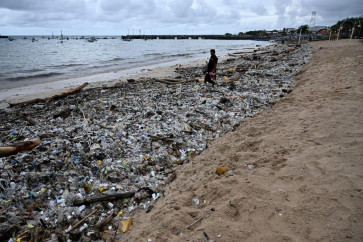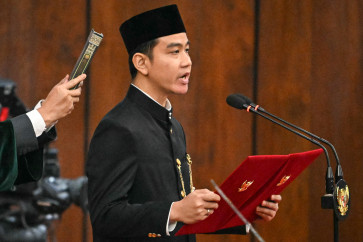Google in full swing to filter fake news
To help contribute better to the global press industry, United States technology giant Google says it is constantly updating algorithms on its news aggregator service to prevent the spread of fake news while ensuring more balanced coverage
Change text size
Gift Premium Articles
to Anyone

T
o help contribute better to the global press industry, United States technology giant Google says it is constantly updating algorithms on its news aggregator service to prevent the spread of fake news while ensuring more balanced coverage.
Google vice president of news Richard Gingras said the company updated Google News’ fact checking modules with the help of a trust project in collaboration with global news outlets and fact-checking organizations.
At its Google News Lab event in Jakarta on Friday, the company invited a group of Indonesian journalists to attend a workshop, during which they learned how to verify information more effectively with various tools and methods.
While Richard admits he has limited knowledge of the current state of Indonesian media, some of the aspects he did learn about were the similarities of the usage of identity politics in both the US presidential election and the recent Jakarta gubernatorial election.
“If you followed [the US] election, it was also much about identity politics. About the haves and have nots; rural communities taking their anger out on others due to their disappeared economies, whether it be immigrants or people of difference. Politicians play on to that, and to some extent, the media does too,” he said in a preceding short lecture at the Google Indonesia office.
News aggregators such as Google News gather content from syndicated sources such as news websites and online newspapers in one location for easy viewing.
All sites included in Google News should follow a set of quality guidelines, including separation between news and promotional content as well as the provision of accessible contact information. Failure to do so may lead to a site being excluded from the service.
Richard, a senior journalist and former CEO of news site salon.com, argues that the importance of the internet is forcing news sites to keep up with the challenges to produce verified stories.
Google News added a fact check feature in April, which places “fact check” tags and ratings alongside links to articles from recognized fact-checking entities when they appear on Google News search results. Google News also has an Indonesian portal, which the company says is subject to the same methods of fact-checking and fake news suppression as any other location.
Regarding the plague of fake news, Richard argues that the term itself has become “weaponized” by politicians against virtually everything that risks opposing them. But regarding the US election, he insisted that the spread of fake news was not a major factor in influencing the outcome of Donald Trump’s victory, but rather it was the presence of hyper-partisan news sites and readers selectively seeking out misrepresented news that goes with their confirmation bias.
To an extent, the scenario also makes sense for the recent Jakarta gubernatorial election, which was reportedly awash with fake reports and hyper-partisan rhetoric utilized for political gain.
“I express my optimism when it comes to data journalism, because it is able to bring more people into a context. Google News’ fact check is part of this filtering of data, and that proves that we have the capability but also need the wisdom to use them,” he said.
The Indonesian government blocked about 800,000 websites as of December last year, most of which contained pornographic material or gambling opportunities. Eighty-five of them were related to radicalism.
Communications and Information Minister Rudiantara, however, acknowledged that such blockage was not the most effective way to prevent the spread of hatred and radical ideas.
“In terms of content supervision, we no longer focus on website blocking but instead paying more attention to improve [digital] literacy among the public through dissemination and education [programs],” he said recently.
Google has until now largely relied on advertising. In 2016, the tech giant made $10 billion from sources other than advertising, such as sales from Google Cloud, Google Play and hardware products, but the figure represented only 11 percent of the company’s total sales.
In Indonesia, the company, through, Singapore-based Google Asia Pacific Pte. Ltd, reported to have gained $109.2 million in revenue from Indonesian clients throughout 2015.
Aside from Google, other giant information sites have also taken measures to tackle the spread of fake news on their platforms. Social media service Facebook recently launched a third-party fact checking tool, which pops up as a warning beside a posted news article, alerting readers to its accuracy by explaining that an article has been disputed by one or more credible sources such as snopes.com.
Meanwhile, the leaders behind user-generated online encyclopedia Wikipedia plan to launch a crowd-funded news service to combat fake news, named Wikitribune, which will see professional journalists and contributors produce fact-checked news stories.









